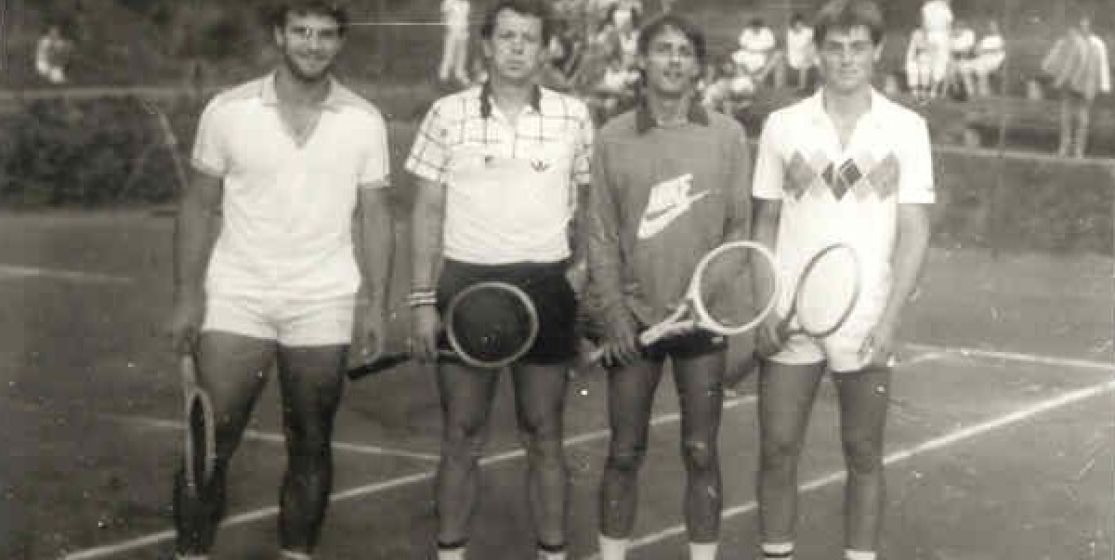Born in East Berlin in 1953, Thomas Emmrich was very close from a great professional tennis career. Stronger than Lendl in junior, he remained "prisoner" of the GDR for his entire career, the Stasi denying him to leave the country. Story of a waste.
"I was born just a little too much east." The few times he agreed to go back on his sad fate, Thomas Emmrich preferred to play the fatalism card. A convenient way to vent all the frustration accumulated during all the years he was forced to play against opponent way under his real level. He could as well have played against a wall. A wall, it was precisely the reason of his misfortune. But not any wall. The most infamous of history. The one with a capital H. The Berlin Wall, built in 1961 to prevent escapes to the west. At the time, Thomas Emmrich was 8 years old and just held his first racquet. He didn't knew it yet but his career was already ruined.
Navratilova’s boyfriend
However, his talent turned out to be truly considerable. In the youth tournaments of the Eastern Bloc, Thomas was the best. Better than Ivan Lendl in particular, that he dominated twice before the latter entered the professional tour. Better than Tomáš Šmid too, another major Czechoslovak champion at the time, who was even ranked 11th in the ATP rankings. Big fan of Roy Emerson, with whom he shared the elegance and the affection of the serve and volley, Emmrich had everything to achieve great things in the best tournaments. Even win a Grand Slam, perhaps? A dream shared with his girlfriend in the early 70's, a girl named Martina Navratilova…
But while the most famous tennis player with glasses left to start her career in the United States, where she even settled permanently in 1975 after changing nationality, Emmrich was condemned to remain in the East. At the time, however, all the other Eastern Bloc countries were authorizing their best players to enter the ATP and WTA Tours, including the Soviet Union. All except the GDR. The reason? East Germany was only obsessed with the success of its athletes in the Olympic disciplines (even resorting to institutionalized doping...). But at the time, tennis was no longer an Olympic sport. So it wasn't considered interesting by Manfred Ewald, the almighty sports minister of the country. GDR maybe had a great champion, capable of competing with the best tennis players the planet, but they never even considered helping him or allowing him leave the country.
Stasi and smuggling
At the beginning, Emmrich protested. He even dared to plead his case directly to Erich Mielke, the Minister of State Security - in other words, the Stasi. But once again, he was served with a categorical refusal. In an attempt to fulfil his dream, his only option was therefore leaving the territory illegally. Try to reach the FRG, just on the other side of the wall, the idea was appealing. "But it was impossible, he recalled recently, in an interview in a German media. Personally, I never joined the Party, but my parents did. They could have suffered from my defection." For fear of reprisals against his family, Emmrich eventually abandoned the idea of going to "the other side". But as a true passionate about his sport, he continued to practice diligently, even if the competition was weak. Between 1970 and 1988, he won a total of 48 national titles, whether in singles, doubles or mixed doubles. On the occasion, he also played the sparring partner in the Davis Cup by BNP Paribas team with other countries of the Eastern Bloc, with as sole compensation a few racquets and tennis shoes that he brought back home. Legend has it that he did some smuggling at the time, to try to make ends meet and adorn his pretty dull life...
Boris Becker, the hero
At some point, Thomas Emmrich thought his luck came at last: in the mid 80s, the IOC decided to reinstate tennis as an Olympic discipline for the 1988 Seoul Olympics. Would the quest for new charms eventually convince the GDR pundits to open their borders to tennis players? Well no, not yet. In the last 80 years, the professional Tennis Tour had changed dramatically. Sponsors arrived, TV became important and it became a business. A twist that was inevitably very unpleasant for the German Communist Party. They refused to let their comrades get perverted in the west. The last opportunity for Emmrich to try the ATP adventure was definitely over this time. When the Berlin Wall finally fell on the 9th of November 1989 the champion was declining. At 36, with injured ligaments, he had just lost his national title for the first time in 18 years.
.jpg)
That same year, it's Boris Becker who symbolized the insolent success of reunited Germany, in peace with its history. Becker was the future, an ambitious young man who had the world at his feet. Emmrich, 14 years his senior, represented a shameful past, the time of the borders, of the Cold War. Not born in the right place at the right time, Thomas still had reason to be envious. "Boris was a model for me, he recalls. Sometimes I said to myself: you too could have won victories as beautiful as him. Yes, I would have loved to know that feeling." Damn wall, damn destiny.
By Régis Delanoë






